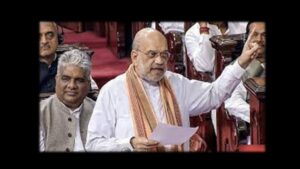Table of Contents
INTRODUCTION
Recently, the Union Home Minister Mr. Amit Shah introduced 3 New Bills in the LOK SABHA that aim to repeal and replace the Indian Penal Code, the Criminal Code for Procedure, and the Indian Evidence Act. which were enacted during the British rule in India.
The new bills are said to prioritize laws that protect women & children and punish the assassins & those who harm the state.

Need of change- The British Parliament had passed them, and we just adopted it. They have references in the UK Parliament, London Gazette, Privy Council, and the British Crown. There are 475 such references. Hence, this sudden change has been brought.
Which new bills will replace the IPC, CrPC, & EVIDENCE ACT?
- The Bharatiya Nyay Sanhita Bill, 2023, which will replace the IPC, 1860
- The Bhartiya Nagrik Suraksha Sanhita Bill, 2023, which will replace the CrPC, 1898
- The Bharatiya Sakshya Bill, 2023, which will replace the Evidence Act, of 1872
The Bills have been framed after extensive consultation with several stakeholders, including Supreme Court and High Court Judges, Law Universities, Chief Ministers, Governors, etc., along with the Committee’s recommendation.
Main Features of the Bharatiya Nyay Sanhita Bill, 2023?
- It repeals the offense of Sedition which was widely criticized as a colonial relic that curbed free speech and dissent.
Section 150 of this new bill states, “Whoever, purposely or knowingly, by words, either spoken or written, or by signs, or by visible representation, or by electronic communication or by use of financial mean, or otherwise, excites or attempts to excite, secession or armed rebellion or subversive activities, or encourages feelings of separatist activities or endangers sovereignty or unity and integrity of India; or indulges in or commits any such act shall be punished with imprisonment for life or with imprisonment which may extend to seven years and shall also be liable to fine,”
- Penalizing mob lynching It prescribes Capital Punishment as the maximum sentence for mob lynching, which has been a menace in recent years.
- false promise of marriage It proposes 10 years imprisonment for sexual intercourse with women on false promise of marriage, which is a common form of deception and exploitation.
- The bill introduces community service as a form of punishment for specific crimes, which can help in reforming offenders and reducing overcrowding in prisons.
- The bill defines terrorism and offenses such as separatism, and armed rebellion against the government, challenging the sovereignty of the country, which were earlier mentioned under different provisions of law.
- The bill fixes a maximum limit of 180 days to file a charge sheet, which can speed up the trial process and prevent indefinite delays
Main Features of the Bhartiya Nagrik Suraksha Sanhita Bill, 2023?
- The bill mandates that police must inform about the status of a complaint in 90 days, which can enhance accountability and transparency.
- Section 41A of the CrPC will be renumbered as Section 35. This change includes an added safeguard, stipulating that no arrest can be made without prior approval from an officer at least at the rank of Deputy Superintendent of Police (DSP), especially for offenses punishable by less than 3 years or for individuals above 60 years.
- It promotes the use of technology for trials, appeals, and recording depositions, allowing video-conferencing for proceedings.
- The bill makes video-recording of statements of survivors of sexual violence compulsory, which can help in preserving evidence and preventing coercion or manipulation.
- The bill requires that police consult the victim before withdrawing a case punishable by seven years or more, which can ensure that justice is not compromised or denied.
- It allows absconding criminals to be tried in-absentia by court and sentenced too, which can deter fugitives from escaping justice.
- It empowers magistrates to take cognizance of offenses based on electronic records such as emails, SMSs, WhatsApp messages etc., which can facilitate evidence collection and verification.
Main Features of Bharatiya Sakshya Bill, 2023?
- The bill defines electronic evidence as any information generated or transmitted by any device or system that is capable of being stored or retrieved by any means.
- It lays down specific criteria for the admissibility of electronic evidence such as authenticity, integrity, reliability, etc., which can prevent misuse or tampering of digital data.
- It provides for special provisions for the admissibility of DNA evidence such as consent, chain of custody, etc., which can enhance the accuracy and reliability of biological evidence.
- It recognizes expert opinion as a form of evidence such as medical opinion, handwriting analysis, etc., which can assist in establishing facts or circumstances relevant to a case.
Indian Penal Code (IPC) is the official criminal code of India drafted in 1860 in the wake of the first law commission established in 1834 under the Charter Act of 1833. Code of Criminal Procedure (CrPC) provides procedures for administering criminal law in India. It was enacted in 1973 and became effective on 1 April 1974. The Indian Evidence Act, originally passed in India by the Imperial Legislative Council in 1872, during the British Raj, contains a set of rules and allied issues governing admissibility of evidence in the Indian courts of law.
MUST READ
FILE A CASE AGAINST A PERSON WHO HAS NOT RETURNED YOUR MONEY
